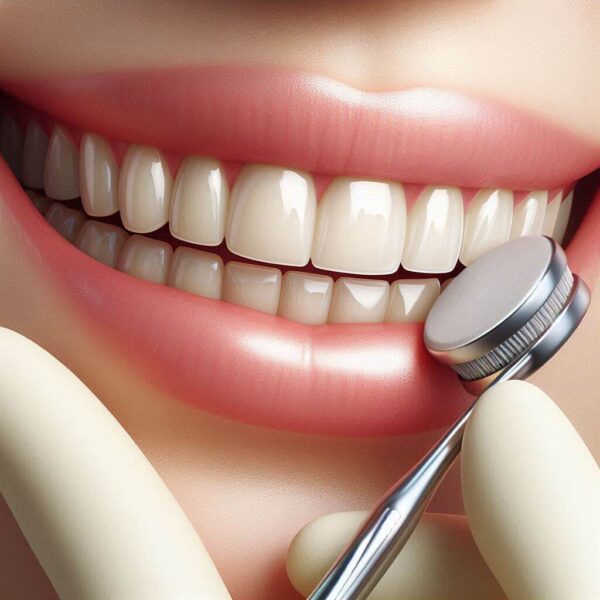
When you run your tongue across your teeth, do they feel smooth, or do you notice a rough, uneven texture? The texture of our teeth is something most of us rarely think about until it feels different than usual.
But should teeth feel smooth? The short answer is: yes, teeth should generally feel smooth. However, let’s delve into what this means and why it matters for your dental health.
Understanding the Smooth Surface of Teeth

The outer layer of your teeth, known as enamel, is the hardest substance in the human body. Enamel is smooth by nature, designed to protect the more sensitive parts of the teeth, like dentin and pulp.
When your teeth are healthy and clean, the enamel should feel smooth to the touch. This smoothness helps prevent plaque buildup, making it harder for bacteria to cling to your teeth and cause decay.
Factors Affecting the Smoothness of Teeth
Several factors can influence whether your teeth feel smooth or rough. Here are some common causes of changes in tooth texture:
- Plaque and Tartar: The most common cause of rough-feeling teeth is the buildup of plaque, a sticky film of bacteria. If plaque isn’t removed regularly through brushing and flossing, it can harden into tartar, which is much rougher and more challenging to remove.
- Tooth Decay: Cavities and tooth decay can cause parts of the enamel to erode, leaving behind a rough or uneven surface. Regular dental check-ups can help catch these issues early before they become severe.
- Enamel Erosion: Acidic foods and drinks, such as citrus fruits and sodas, can erode enamel over time, leading to a rough texture. Acid reflux can also contribute to enamel erosion.
- Dental Procedures: Fillings, crowns, and other dental work might change the texture of a tooth, especially if the surface isn’t polished properly after the procedure.
Maintaining Smooth Teeth
To keep your teeth feeling smooth and healthy, follow these dental care tips:
- Brush Regularly: Brush your teeth at least twice a day using fluoride toothpaste. Make sure to reach all surfaces of your teeth to remove plaque effectively.
- Floss Daily: Flossing removes plaque and food particles from between your teeth which a toothbrush can’t reach.
- Limit Acidic Foods and Drinks: Reduce your intake of foods and beverages that can erode enamel. If you consume them, rinse your mouth with water afterward.
- Regular Dental Check-Ups: Visit your dentist regularly for professional cleanings and to check for any signs of tooth decay or enamel erosion.
- Stay Hydrated: Drinking water helps wash away food particles and bacteria, maintaining a smoother tooth surface.
I hope now you aware of the question Should Teeth Feel Smooth? and its detailed answer if you feel still lost read the rest of the article all about Should Teeth Feel Smooth?
What is Teeth Smoothing? The Art of Perfecting Your Smile

Teeth smoothing, also known as dental recontouring or enameloplasty, is like giving your smile a touch of finesse. This cosmetic dental procedure involves the meticulous reshaping of your teeth’s surface, transforming minor imperfections into a picture-perfect smile.
Imagine a sculptor refining the details of a masterpiece—that’s what teeth smoothing does for your teeth.
The Process: Crafting Perfection
Envision a dentist wielding a fine abrasive tool or a laser with the precision of an artist. During teeth smoothing, they delicately remove tiny amounts of enamel to correct flaws such as minor chips, irregular shapes, and slight overlaps or misalignments.
The result? A smoother, more harmonious appearance.
This minimally invasive procedure is often completed in a single visit and typically doesn’t require anesthesia. You’ll feel a gentle vibration or pressure, but it’s a small price to pay for a dazzling transformation.
The amount of enamel removed is minimal, ensuring that the structural integrity of your teeth is preserved.
Immediate and Lasting Benefits
The magic of teeth smoothing lies in its ability to deliver immediate improvements. Rough edges are polished away, leaving your teeth feeling sleek and smooth to the touch.
This not only enhances your comfort but also makes it more challenging for plaque to cling to your teeth, promoting better oral hygiene and reducing the risk of cavities and gum disease.
Aesthetic and Health Enhancements
Beyond the obvious cosmetic benefits, teeth smoothing can contribute to better dental health. By eliminating small crevices and rough spots where bacteria can accumulate, the procedure helps maintain a cleaner and healthier mouth.
Teeth smoothing is often considered when minor cosmetic changes are desired, especially when combined with other treatments such as teeth whitening or bonding.
It’s an excellent option for those looking to make subtle enhancements without undergoing more extensive dental work.
Is Having Smooth Teeth Beneficial for Your Mouth?

When you glide your tongue over your teeth, the smooth surface should feel satisfying. But beyond the tactile pleasure, does having smooth teeth offer benefits for your overall oral health? The answer is a resounding yes. Here’s why maintaining a smooth tooth surface is advantageous for your mouth.
Enhancing Oral Hygiene
Smooth teeth make it harder for plaque to accumulate. Plaque, a sticky film of bacteria, can cling to rough or uneven surfaces more easily. By ensuring your teeth are smooth, you reduce the potential for plaque buildup. Less plaque means a lower risk of cavities, gum disease, and other dental issues. Regular brushing and flossing are more effective on smooth surfaces, helping you maintain better oral hygiene with less effort.
Preventing Tooth Decay
Rough or irregular surfaces can create tiny crevices where food particles and bacteria can hide. These areas are often harder to clean, leading to an increased risk of tooth decay. Smoothing out these imperfections minimizes the places where decay can begin, contributing to stronger, healthier teeth.
Reducing Gum Irritation
Gums can become irritated by rough edges or uneven dental work. Smooth teeth create a gentler environment for your gums, reducing the likelihood of inflammation and discomfort. This is particularly important for people with sensitive gums or those prone to gum disease.
Improving Comfort and Sensation
A smooth tooth surface feels better against your tongue and cheeks. This can enhance your overall comfort and make eating and speaking more pleasant. People often don’t realize how much rough or uneven teeth affect their daily life until they experience the difference that smooth teeth can make.
Boosting Confidence
A smooth, polished smile looks more attractive and feels cleaner. This boost in appearance can enhance your self-confidence and make you more willing to smile and engage socially. Whether in personal interactions or professional settings, a confident smile can have a significant positive impact.
Aiding in Dental Work
For those who have dental restorations like fillings or crowns, ensuring these surfaces are smooth is crucial. Rough or uneven dental work can lead to discomfort and further dental issues.
Dentists often smooth out these surfaces to ensure they blend seamlessly with your natural teeth, providing a comfortable and aesthetically pleasing result.
What Does It Mean When Your Teeth Feel Fuzzy?

Ever run your tongue over your teeth and notice a fuzzy or filmy sensation? This is a common experience that can be perplexing and sometimes concerning.
The “fuzzy” feeling on your teeth usually indicates the presence of plaque, a sticky film of bacteria that naturally forms on the surfaces of your teeth. Here’s what you need to know about why your teeth might feel this way and what you can do about it.
The Role of Plaque
Plaque is a soft, sticky substance that builds up on your teeth throughout the day. It forms when bacteria in your mouth mix with sugary or starchy foods.
As the bacteria break down these foods, they produce acids that can attack tooth enamel and lead to decay. Plaque is most noticeable when it accumulates, giving your teeth that fuzzy feeling.
Causes of Fuzzy-Feeling Teeth
- Inadequate Oral Hygiene: If you haven’t brushed or flossed properly, plaque can build up quickly. This is particularly noticeable in the morning after a night’s sleep or later in the day if you haven’t brushed after meals.
- Diet: Consuming sugary or starchy foods and drinks can increase plaque formation. Foods that stick to your teeth, such as candy, bread, and potato chips, can be particularly problematic.
- Dehydration: A dry mouth can lead to a buildup of plaque. Saliva helps wash away food particles and bacteria, so when your mouth is dry, plaque can accumulate more easily.
- Changes in Saliva: Certain medications or health conditions can reduce saliva flow, leading to an increase in plaque and that fuzzy feeling on your teeth.
Consequences of Ignoring Plaque
If left untreated, plaque can harden into tartar, which is much harder to remove and can lead to more serious dental issues such as gingivitis and periodontal disease. Tartar buildup can also make your teeth look yellow and feel rough.
Preventing and Treating Fuzzy-Feeling Teeth
To avoid that fuzzy feeling and keep your teeth smooth and clean, follow these steps:
- Brush Regularly: Brush your teeth at least twice a day with fluoride toothpaste. Make sure to brush all surfaces of your teeth, including the fronts, backs, and chewing surfaces.
- Floss Daily: Flossing removes plaque and food particles from between your teeth and along the gumline, areas that your toothbrush can’t reach.
- Use Mouthwash: An antibacterial mouthwash can help reduce plaque and bacteria in your mouth.
- Stay Hydrated: Drink plenty of water throughout the day to help wash away food particles and bacteria.
- Limit Sugary and Starchy Foods: Reducing your intake of sugary and starchy foods can help prevent plaque buildup.
- Regular Dental Check-Ups: Visit your dentist regularly for professional cleanings and check-ups. Your dentist can remove tartar and check for any signs of decay or gum disease.
What Causes Fuzzy-Feeling Teeth?

Ever run your tongue over your teeth and encounter a fuzzy sensation? It’s a peculiar feeling that often raises questions. This sensation usually indicates the presence of plaque, a sticky film of bacteria that naturally accumulates on tooth surfaces. Let’s explore the stylish rendition of the causes behind this phenomenon:
Inadequate Oral Hygiene
Neglecting proper oral care practices can swiftly lead to a buildup of plaque. This is especially noticeable after periods of rest, like waking up in the morning or when forgetting to brush after meals.
Dietary Habits
Consuming sugary or starchy foods fuels plaque formation. Foods that linger on teeth, such as candies, bread, and chips, contribute significantly to that fuzzy feeling.
Dehydration
A dry mouth creates an ideal environment for plaque accumulation. Saliva aids in rinsing away food particles and bacteria, so when saliva production decreases, plaque buildup intensifies.
Changes in Saliva
Certain medications or health conditions can alter saliva composition or production, resulting in increased plaque buildup and, consequently, that fuzzy sensation on teeth.
Consequences of Ignoring Plaque
Allowing plaque to persist can lead to its hardening into tartar, a more stubborn substance that heightens the risk of gum disease and other oral health issues. Tartar buildup can also detract from dental aesthetics, causing teeth to appear yellowish and feel rough.
Prevention and Treatment
Maintaining a smooth, plaque-free mouth involves consistent oral hygiene practices:
- Regular Brushing: Brush teeth at least twice daily with fluoride toothpaste, covering all surfaces thoroughly.
- Daily Flossing: Clear out plaque and food debris from between teeth and along the gumline with floss.
- Mouthwash Use: Incorporate an antibacterial mouthwash to further reduce plaque and bacteria.
- Hydration: Stay adequately hydrated to facilitate the natural cleansing action of saliva.
- Dietary Awareness: Limit sugary and starchy foods to mitigate plaque buildup.
- Routine Dental Visits: Schedule regular dental check-ups for professional cleanings and early detection of any dental issues.
What to Do If Your Teeth Still Feel Fuzzy

Ever find yourself running your tongue over your teeth, only to encounter that persistent fuzzy sensation? It can be frustrating, especially if you’ve been diligent with your oral hygiene routine. But fear not! Here’s a stylish guide on what to do if your teeth still feel fuzzy:
1. Reassess Your Oral Hygiene Routine:
Start by evaluating your brushing and flossing habits. Are you brushing at least twice a day with fluoride toothpaste? Are you flossing daily to remove plaque and food debris from between your teeth? Sometimes, a simple adjustment to your routine can make a big difference.
2. Check Your Technique:
Even if you’re brushing and flossing regularly, your technique might not be up to par. Make sure you’re brushing for at least two minutes each session, using gentle circular motions and reaching all surfaces of your teeth. When flossing, be thorough but gentle to avoid irritating your gums.
3. Consider Your Diet:
Take a closer look at your dietary habits. Are you consuming a lot of sugary or starchy foods and beverages? These can contribute to plaque buildup and that fuzzy feeling on your teeth. Try to limit your intake of these foods and opt for healthier alternatives whenever possible.
4. Stay Hydrated:
Dehydration can exacerbate plaque buildup, so make sure you’re drinking plenty of water throughout the day. Water helps rinse away food particles and bacteria, keeping your mouth clean and your teeth feeling smooth.
5. Address Underlying Issues:
If you’re still experiencing persistent fuzziness despite improving your oral hygiene and diet, there may be underlying issues at play. Certain medications, health conditions, or changes in saliva production can affect plaque buildup. Consider consulting with your dentist or healthcare provider for further evaluation and guidance.
6. Schedule a Dental Check-Up:
Regular dental check-ups are essential for maintaining good oral health. If it’s been a while since your last visit, schedule an appointment with your dentist. They can perform a professional cleaning to remove any stubborn plaque or tartar and assess the overall health of your teeth and gums.
7. Explore Additional Treatment Options:
In some cases, your dentist may recommend additional treatments to address persistent plaque buildup. This could include dental recontouring to smooth rough areas of your teeth or prescription mouth rinses to help control bacteria.
8. Stay Committed to Oral Health:
Finally, remember that maintaining good oral health is an ongoing commitment. Continue to prioritize regular brushing, flossing, and dental check-ups, and make adjustments to your routine as needed to keep your teeth feeling clean and fuzzy-free.
By following these steps and staying proactive about your oral health, you can banish that fuzzy feeling and enjoy a smoother, healthier smile
Conclusion
In conclusion, the sensation of smoothness in your teeth is not only desirable but also indicative of good oral health. Smooth teeth are more comfortable, easier to clean, and less prone to plaque buildup, cavities, and gum disease.
If your teeth feel rough or fuzzy, it may be a sign of inadequate oral hygiene, dietary habits, dehydration, or underlying dental issues. By prioritizing regular brushing, flossing, hydration, and dental check-ups, you can maintain smooth, healthy teeth and enjoy a confident smile.
Frequently Asked Questions (FAQ)
Q1. Should teeth feel smooth to the touch?
A1. Yes, ideally, teeth should feel smooth when you run your tongue over them. Smooth teeth are easier to clean and less likely to harbor plaque and bacteria.
Q2. What causes rough or fuzzy-feeling teeth?
A2. Rough or fuzzy-feeling teeth are often caused by plaque buildup, which can result from inadequate oral hygiene, dietary habits, dehydration, or underlying dental issues.
Q3. How can I make my teeth feel smoother?
A3. To make your teeth feel smoother, prioritize regular brushing with fluoride toothpaste, daily flossing, staying hydrated, and scheduling routine dental check-ups for professional cleanings.
Q4. Can I fix rough or uneven teeth?
A4. Yes, rough or uneven teeth can often be corrected through dental treatments such as enameloplasty (teeth smoothing), dental bonding, veneers, or orthodontic treatment, depending on the underlying cause.
Q5. Are there any home remedies for smoothing teeth?
A5. While there are no effective home remedies for smoothing teeth, maintaining good oral hygiene practices and following a healthy diet can help prevent plaque buildup and keep your teeth feeling smooth. However, for significant roughness or irregularities, it’s best to consult with a dentist for professional treatment options.
